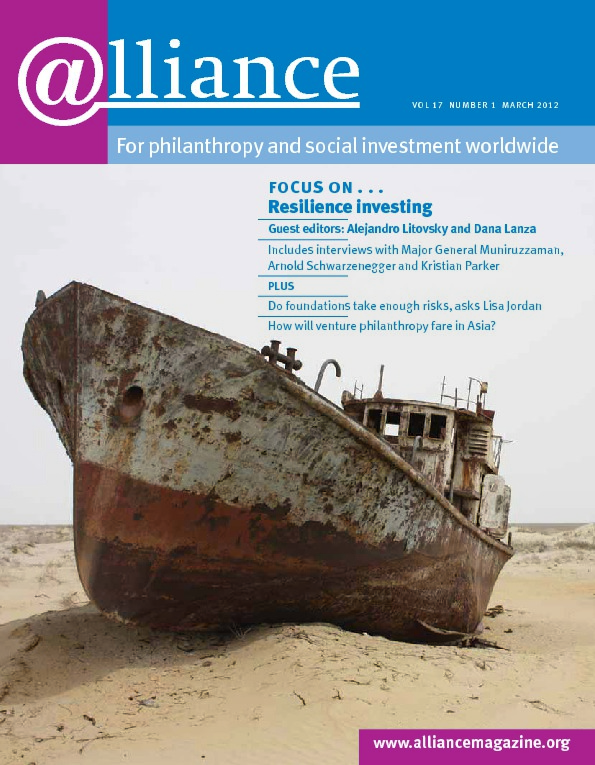Philanthropy in the Arab world can never be the same again. No longer will it be possible to smooch up to authoritarian governments by performing charitable acts. Foundations will have to play their full part in the transitions to peace and democracy by supporting civil society and governance reform. That was the central message of the Alliance Breakfast Club, held to follow up the December issue of Alliance on ‘Responding to the hopes of the Arab Spring’.
A three-person panel composed of Atallah Kuttab, guest editor of the December special issue and founder chairman of SAANED, Zina Jardaneh, a board member of the Welfare Association, and Salah Khalil, an Egyptian businessman and founder of the Alexandria Trust, were united in their optimism that the transitions will take root. Although they acknowledged risks, such as the potential for prolonged civil conflict and the rise of radical Islam under leaders unwilling to share power with secular political parties, the panel felt that democracy and peace will eventually prevail, and Arab states will join a community of enlightened peers.
Speakers were in no doubt that philanthropy has a vital role to play. At the same time, it will have to raise its game to realize its full potential. People from the audience cited difficulties in the way that philanthropy had performed in earlier transitions in Central and Eastern Europe. Following the collapse of the Berlin Wall, foundations had typically rushed in, funded initiatives without understanding local culture, and rushed out again leaving their grantees high and dry. There is now much experience of grantmaking that suggests that success is delivered by building local capacity. In the Arab region, however, there is little respect for foreign funders, because they have typically pursued their own political agendas, got too close to repressive regimes, and ignored the wishes of local people.
People at the meeting felt that foundations should strengthen the hand of local people. Salah Khalil explained how the Alexandria Trust is developing a new generation of citizens who can act as informed citizens. This is a good model for foundations to support because, rather than developing off-the-shelf solutions, local people can develop their own solutions based on their perceptions of need.
Zina Jardaneh pointed out that this approach implies a human rights dimension that cannot be ignored. In Tahrir Square, people chanted ‘Bread, freedom, social justice’. Since this is what people want, this is what foundations should support. This implies an agenda based on inclusion and equity, both of which are lacking in the Arab region. Despite the considerable wealth in the region, it is not shared fairly, with large disparities both between countries and within the same country. Young people have few employment prospects and there is discrimination against women everywhere. The transition has to address these issues and develop open and tolerant societies where people, regardless of race, ethnicity, religion or other characteristics, can play a full part in economic, social and political life.
This implies a secular approach to philanthropy. Atallah Kuttab said the label ‘Islamic philanthropy’ confused him. ‘Religion is about me and my god, but the country should be for everyone,’ he said. It follows that the values that underpin the development of the country should be based on respect for all. Women have played leading roles in the transition, and should play leading roles in societies after the transition. It is also important to encourage young people’s leadership for it is the coming generation that will drive reforms through.
The diaspora is an important dimension. In many European cities, Arab populations make up a significant minority, and London has long been a capital of Arab culture. The meeting saw great value in harnessing the power of the diaspora. Although there are elements of fear and apathy about getting involved, there are also signs of much more engagement and money is beginning to flow. European foundations can form partnerships with diaspora communities, and strengthening their hand in working for the benefit of the region could be a particularly strategic approach, both in terms of transitions in the region and in terms of encouraging harmony in Europe.
The issues discussed at the breakfast meeting are being taken forward by the Global Philanthropy Leadership Initiative (GPLI), which has developed a ‘Road Map for Peaceful Transitions in North Africa and the Middle East’.
Barry Knight is Secretary to Centris. Email barryknight@cranehouse.eu
For more information
For more on GPLI, contact Sevdalina Rukanova at the EFC at SRukanova@efc.be


Comments (0)